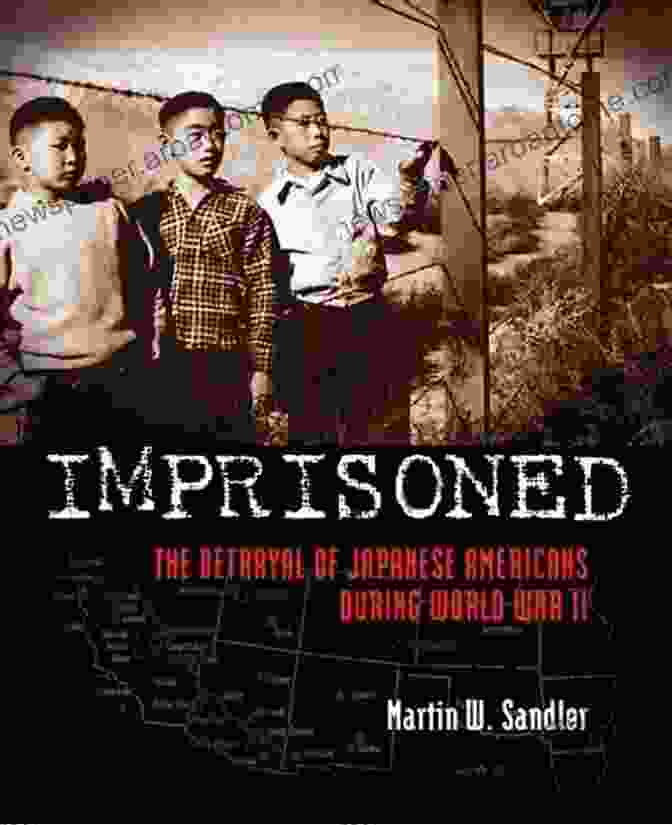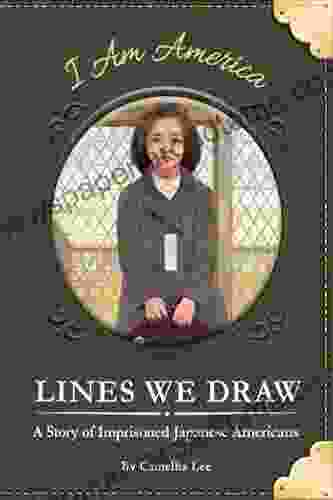Story of Imprisoned Japanese Americans: A Must-Read Chronicle of Resilience, Injustice, and the American Spirit


In the wake of the horrific events of Pearl Harbor, the United States government embarked on a shameful and unconstitutional campaign of mass incarceration against its own citizens of Japanese descent. Over 120,000 Japanese Americans, including men, women, children, and the elderly, were forcibly removed from their homes and communities and imprisoned in desolate and overcrowded detention camps throughout the country.
4.5 out of 5
| Language | : | English |
| File size | : | 22495 KB |
| Text-to-Speech | : | Enabled |
| Enhanced typesetting | : | Enabled |
| Word Wise | : | Enabled |
| Print length | : | 133 pages |
| Lending | : | Enabled |
| Screen Reader | : | Supported |
"Story of Imprisoned Japanese Americans" is a gripping and deeply moving account of this dark chapter in American history. Through firsthand accounts, historical documents, and poignant photographs, the book paints a vivid picture of the unjust treatment, resilience, and indomitable spirit of these individuals who were unjustly imprisoned simply because of their heritage.
Unveiling the Hidden History
In the months following Pearl Harbor, fear and paranoia gripped the United States as the nation grappled with the shock of being attacked on its own soil. The government, driven by a combination of racism, xenophobia, and war hysteria, scapegoated Japanese Americans as potential threats to national security.
Despite a complete lack of evidence supporting these claims, President Franklin D. Roosevelt signed Executive Free Download 9066 on February 19, 1942. This executive Free Download authorized the War Department to remove all persons of Japanese descent from the West Coast, regardless of their citizenship or loyalty to the United States.
The process of removing Japanese Americans from their homes was swift and brutal. Families were given only a few days' notice to pack their belongings and report to assembly centers. From there, they were transported to hastily constructed detention camps, where they would spend the next several years of their lives living in cramped and unsanitary conditions.
Life in the Camps
The detention camps were overcrowded, underfunded, and ill-prepared to accommodate the influx of prisoners. The inmates were forced to live in barracks-style housing, with little privacy or access to basic amenities. They were subjected to unsanitary conditions, inadequate medical care, and a constant fear of violence and harassment.
Despite these deplorable conditions, the Japanese Americans in the camps demonstrated remarkable resilience and determination. They organized schools, newspapers, and community activities, determined to maintain a sense of normalcy and dignity in the face of adversity.
Challenging Injustice
As the war progressed, some Japanese Americans began to challenge their unjust imprisonment. In 1944, a group of detainees known as the Heart Mountain Fair Play Committee filed a lawsuit against the government, arguing that their detention was unconstitutional. This lawsuit ultimately reached the Supreme Court, which ruled in 1944 that the government could not detain Japanese Americans solely on the basis of their race.
However, the government's response to this victory was to release the detainees from the camps but prevent them from returning to their homes on the West Coast. Many Japanese Americans were forced to spend years in temporary housing or relocate to other parts of the country.
Postwar Struggle and Redemption
After the war, Japanese Americans faced a long and difficult struggle to rebuild their lives. They faced discrimination in housing, employment, and education, and many were haunted by the trauma they had experienced during the war years.
However, over time, Japanese Americans have achieved remarkable progress in overcoming the legacy of racism and injustice. They have made significant contributions to American society in all walks of life, from politics and business to the arts and sciences.
In 1988, President Ronald Reagan signed the Civil Liberties Act, which formally apologized for the government's wartime treatment of Japanese Americans and provided reparations to those who had been unjustly imprisoned. This act marked a significant step in the nation's healing process and served as a powerful reminder of the importance of upholding civil liberties and protecting the rights of all Americans.
A Legacy of Resilience and Hope
"Story of Imprisoned Japanese Americans" is not merely a historical account of injustice; it is also a testament to the resilience and indomitable spirit of the human soul. The Japanese Americans who were imprisoned during World War II endured unspeakable hardships, but they never gave up hope. They fought for their rights, they preserved their culture, and they ultimately prevailed over adversity.
Their story is a powerful reminder that even in the darkest of times, it is possible to find strength, courage, and hope. It is a story that should be read and remembered by all Americans, as a cautionary tale about the dangers of prejudice and discrimination, and as an inspiration to fight for justice and equality for all.
Free Download Your Copy Today
"Story of Imprisoned Japanese Americans" is a must-read for anyone interested in American history, civil rights, or the Japanese American experience. It is a powerful and moving account of one of the darkest chapters in our nation's history, but it is also a story of resilience, hope, and the enduring power of the human spirit.
Free Download your copy today and learn the untold story of the Japanese Americans who were imprisoned during World War II. You can find it at your local bookstore or online at Our Book Library, Barnes & Noble, or wherever books are sold.
4.5 out of 5
| Language | : | English |
| File size | : | 22495 KB |
| Text-to-Speech | : | Enabled |
| Enhanced typesetting | : | Enabled |
| Word Wise | : | Enabled |
| Print length | : | 133 pages |
| Lending | : | Enabled |
| Screen Reader | : | Supported |
Do you want to contribute by writing guest posts on this blog?
Please contact us and send us a resume of previous articles that you have written.
 Book
Book Novel
Novel Page
Page Chapter
Chapter Text
Text Story
Story Genre
Genre Reader
Reader Library
Library Paperback
Paperback E-book
E-book Magazine
Magazine Newspaper
Newspaper Paragraph
Paragraph Sentence
Sentence Bookmark
Bookmark Shelf
Shelf Glossary
Glossary Bibliography
Bibliography Foreword
Foreword Preface
Preface Synopsis
Synopsis Annotation
Annotation Footnote
Footnote Manuscript
Manuscript Scroll
Scroll Codex
Codex Tome
Tome Bestseller
Bestseller Classics
Classics Library card
Library card Narrative
Narrative Biography
Biography Autobiography
Autobiography Memoir
Memoir Reference
Reference Encyclopedia
Encyclopedia Robert Frump
Robert Frump Joni Mayhan
Joni Mayhan Joseph E Ross
Joseph E Ross Yuri Elkaim
Yuri Elkaim Patricia James
Patricia James Jp Reynolds
Jp Reynolds Kivi Leroux Miller
Kivi Leroux Miller Judi Merriam
Judi Merriam Jonathan Harnisch
Jonathan Harnisch Josh Robbins
Josh Robbins Robert M Price
Robert M Price Pamela Mccauley
Pamela Mccauley Julia Vogel
Julia Vogel Julia Cruise
Julia Cruise Paul Hughes
Paul Hughes Scott Lindquist
Scott Lindquist John Warwick Montgomery
John Warwick Montgomery Sue Hickey
Sue Hickey Sue Barker
Sue Barker Karen L Simon
Karen L Simon
Light bulbAdvertise smarter! Our strategic ad space ensures maximum exposure. Reserve your spot today!

 Branson CarterInfrastructure Technology And Solutions Electric Power And Energy Engineering
Branson CarterInfrastructure Technology And Solutions Electric Power And Energy Engineering
 Fabian MitchellUnlock the Power of Education: Delve into the 8th Edition of Research and...
Fabian MitchellUnlock the Power of Education: Delve into the 8th Edition of Research and... Art MitchellFollow ·13.7k
Art MitchellFollow ·13.7k Mikhail BulgakovFollow ·3.2k
Mikhail BulgakovFollow ·3.2k Yukio MishimaFollow ·8.7k
Yukio MishimaFollow ·8.7k Reed MitchellFollow ·5.7k
Reed MitchellFollow ·5.7k Clinton ReedFollow ·4.2k
Clinton ReedFollow ·4.2k Devin RossFollow ·7.4k
Devin RossFollow ·7.4k Avery SimmonsFollow ·8.3k
Avery SimmonsFollow ·8.3k Al FosterFollow ·9.2k
Al FosterFollow ·9.2k

 Sidney Cox
Sidney CoxSpiritualism in the American Civil War
An Unseen Force in the...

 Robbie Carter
Robbie CarterEmpowering Healthcare Professionals: Discover the...
Welcome to the world of...

 Virginia Woolf
Virginia WoolfUnveil the Secrets of Nature's Healing Scents: "Growing...
Embark on an aromatic journey...

 Martin Cox
Martin CoxThe Fat Girl's Guide to Loving Your Body: Empowering...
Alt attribute: Confident plus-size woman...

 Graham Blair
Graham BlairUnlock the Secrets of Vegetables: Their Nutritional Power...
In the realm of culinary delights and...

 H.G. Wells
H.G. WellsStep-by-Step Guide to Crafting Astonishing Kumihimo...
Are you ready to embark on a captivating...
4.5 out of 5
| Language | : | English |
| File size | : | 22495 KB |
| Text-to-Speech | : | Enabled |
| Enhanced typesetting | : | Enabled |
| Word Wise | : | Enabled |
| Print length | : | 133 pages |
| Lending | : | Enabled |
| Screen Reader | : | Supported |








